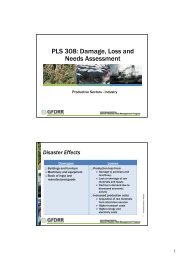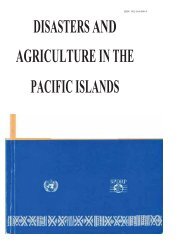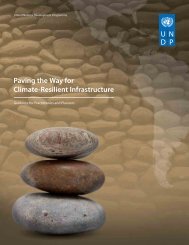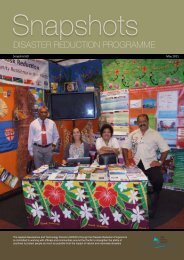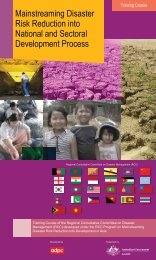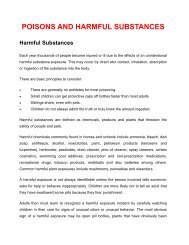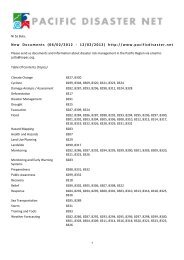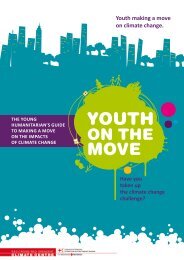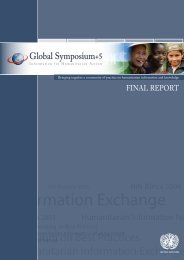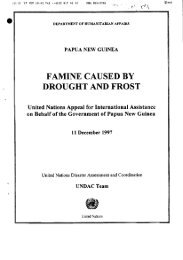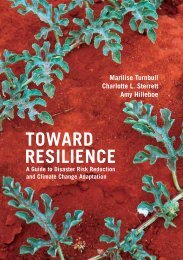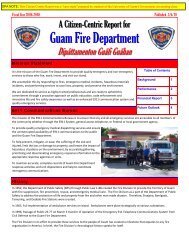- Page 1: DLiving with RiskA global review of
- Page 5 and 6: Bastien Affeltranger, FranceTom Alc
- Page 7: IntroductionThis is a preliminary v
- Page 10: “Imagine all the people…”It w
- Page 13: Eruption of Mount Agung, Bali, Indo
- Page 16 and 17: Living with risk - focus on disaste
- Page 20 and 21: Taking these developments into acco
- Page 22 and 23: Living with risk - focus on disaste
- Page 24 and 25: Disaster risk reduction - a sharedr
- Page 26 and 27: Living with risk - focus on disaste
- Page 28 and 29: A disaster is a function of the ris
- Page 30 and 31: Disaster risk management and reduct
- Page 32 and 33: Living with risk - focus on disaste
- Page 34 and 35: Living with risk - focus on disaste
- Page 36 and 37: Living with risk - focus on disaste
- Page 38 and 39: Living with risk - focus on disaste
- Page 40 and 41: Living with risk - focus on disaste
- Page 42 and 43: Chapter2Risk awareness and assessme
- Page 46 and 47: Understanding the nature of hazards
- Page 48 and 49: Risk awareness and assessment2Map-
- Page 50 and 51: The figure below illustrates the fo
- Page 52 and 53: Trends in disaster impactWhile no c
- Page 54 and 55: Trends in hazardsUntil recently, th
- Page 56 and 57: Risk awareness and assessment2Nyira
- Page 58 and 59: Risk awareness and assessment2ISDR
- Page 60 and 61: Risk awareness and assessment2Reduc
- Page 62 and 63: Risk awareness and assessment2Wildl
- Page 64 and 65: Risk awareness and assessment2Prima
- Page 66 and 67: Risk awareness and assessment215 la
- Page 68 and 69:
dering external debts that constitu
- Page 70 and 71:
The identification of hazards usual
- Page 72 and 73:
consideration about the nature of i
- Page 74 and 75:
Risk awareness and assessment2Bern
- Page 76 and 77:
Risk awareness and assessment2THE P
- Page 78 and 79:
Risk awareness and assessment2The R
- Page 80 and 81:
Risk awareness and assessment2Ecoci
- Page 82 and 83:
Chapter3Policy and public commitmen
- Page 84 and 85:
Policy and public commitment: the f
- Page 86 and 87:
Policy frameworks in practiceAsiaDi
- Page 88 and 89:
process that emphasizes the partici
- Page 90 and 91:
Policy and public commitment: the f
- Page 92 and 93:
Policy and public commitment: the f
- Page 94 and 95:
announced the creation of the Offic
- Page 96 and 97:
established with necessary legislat
- Page 98 and 99:
Policy and public commitment: the f
- Page 100 and 101:
Key policy proposals contained in t
- Page 102 and 103:
Under the mandate of the CTGC, a se
- Page 104 and 105:
Policy and public commitment: the f
- Page 106 and 107:
Policy and public commitment: the f
- Page 108 and 109:
Following recommendations, the city
- Page 110 and 111:
underway to upgrade the Swiss Natio
- Page 112 and 113:
damage to introducing means that ca
- Page 114 and 115:
The last earthquake to devastate Ka
- Page 116 and 117:
Policy and public commitment: the f
- Page 118 and 119:
• Formulating distinctive risk re
- Page 120 and 121:
Policy and public commitment: the f
- Page 122 and 123:
AfricaSouthern AfricaPolicy and pub
- Page 124 and 125:
Policy and public commitment: the f
- Page 126 and 127:
y the conduct of monthly meetings d
- Page 128 and 129:
develop closer working relationship
- Page 130 and 131:
mechanisms among SAARC countries fo
- Page 132 and 133:
Policy and public commitment: the f
- Page 134 and 135:
Policy and public commitment: the f
- Page 136 and 137:
ients as unencumbered assistance. A
- Page 138 and 139:
able outcomes within individual Pac
- Page 140 and 141:
EuropeWestern EuropeResearch is one
- Page 142 and 143:
http://europa.eu.int/comm/environme
- Page 144 and 145:
Policy and public commitment: the f
- Page 146 and 147:
Policy and public commitment: the f
- Page 148 and 149:
ter. By working together with commu
- Page 150 and 151:
ing socio-economic considerations w
- Page 152 and 153:
Case: Central American countries,co
- Page 154 and 155:
experience of National Societies of
- Page 156 and 157:
Chapter4Building understanding: dev
- Page 158 and 159:
Building understanding: development
- Page 160 and 161:
International scope of informationT
- Page 162 and 163:
environmental changes, including el
- Page 164 and 165:
Regional initiativesRegional inform
- Page 166 and 167:
Building understanding: development
- Page 168 and 169:
North AmericaThe Natural Hazards Re
- Page 170 and 171:
EuropeA different type of informati
- Page 172 and 173:
created a more readily understood c
- Page 174 and 175:
Technical information service conve
- Page 176 and 177:
ole in defining these future requir
- Page 178 and 179:
A second initiative to disseminate
- Page 180 and 181:
support, contribute to the establis
- Page 182 and 183:
issues, climatic uncertainty, chang
- Page 184 and 185:
Building understanding: development
- Page 186 and 187:
anism that has been exploited to on
- Page 188 and 189:
preparedness are frequently attribu
- Page 190 and 191:
Institutional basis to transmit exp
- Page 192 and 193:
lic information must necessarily in
- Page 194 and 195:
information including links to many
- Page 196 and 197:
Building understanding: development
- Page 198 and 199:
ized a workshop with the support of
- Page 200 and 201:
nication remains the local language
- Page 202 and 203:
In 2001, government officials, ADRC
- Page 204 and 205:
challengesFuture challenges and pri
- Page 206:
Chapter5A selection of disasterredu
- Page 209 and 210:
5Living with Risk: A global review
- Page 211 and 212:
5Living with Risk: A global review
- Page 213 and 214:
5Living with Risk: A global review
- Page 215 and 216:
5Living with Risk: A global review
- Page 217 and 218:
5Living with Risk: A global review
- Page 219 and 220:
5Living with Risk: A global review
- Page 221 and 222:
5Living with Risk: A global review
- Page 223 and 224:
5Living with Risk: A global review
- Page 225 and 226:
5Living with Risk: A global review
- Page 227 and 228:
5Living with Risk: A global review
- Page 229 and 230:
5Living with Risk: A global review
- Page 231 and 232:
5Living with Risk: A global review
- Page 233 and 234:
5Living with Risk: A global review
- Page 235 and 236:
5Living with Risk: A global review
- Page 237 and 238:
5Living with Risk: A global review
- Page 239 and 240:
5Living with Risk: A global review
- Page 241 and 242:
5Living with Risk: A global review
- Page 243 and 244:
5Living with Risk: A global review
- Page 245 and 246:
5Living with Risk: A global review
- Page 247 and 248:
5Living with Risk: A global review
- Page 249 and 250:
5Living with Risk: A global review
- Page 251 and 252:
5Living with Risk: A global review
- Page 253 and 254:
5Living with Risk: A global review
- Page 255 and 256:
5Living with Risk: A global review
- Page 257 and 258:
5Living with Risk: A global review
- Page 259 and 260:
5Living with Risk: A global review
- Page 261 and 262:
5Living with Risk: A global review
- Page 263 and 264:
5Living with Risk: A global review
- Page 265 and 266:
5Living with Risk: A global review
- Page 267 and 268:
5Living with Risk: A global review
- Page 269 and 270:
5Living with Risk: A global review
- Page 271 and 272:
5Living with Risk: A global review
- Page 273 and 274:
5Living with Risk: A global review
- Page 275 and 276:
5Living with Risk: A global review
- Page 277 and 278:
5Living with Risk: A global review
- Page 279 and 280:
5Living with Risk: A global review
- Page 281 and 282:
5Living with Risk: A global review
- Page 283 and 284:
5Living with Risk: A global review
- Page 285 and 286:
5Living with Risk: A global review
- Page 287 and 288:
5Living with Risk: A global review
- Page 289 and 290:
Photo: G. Berz, Munich Re
- Page 291 and 292:
6Living with Risk: A global review
- Page 293 and 294:
6Living with Risk: A global review
- Page 295 and 296:
6Living with Risk: A global review
- Page 297 and 298:
6Living with Risk: A global review
- Page 299 and 300:
6Living with Risk: A global review
- Page 301 and 302:
6Living with Risk: A global review
- Page 303 and 304:
6Living with Risk: A global review
- Page 305 and 306:
6Living with Risk: A global review
- Page 307 and 308:
6Living with Risk: A global review
- Page 309 and 310:
6Living with Risk: A global review
- Page 311 and 312:
6Living with Risk: A global review
- Page 313 and 314:
6Living with Risk: A global review
- Page 315 and 316:
6Living with Risk: A global review
- Page 317 and 318:
6Living with Risk: A global review
- Page 319 and 320:
6Living with Risk: A global review
- Page 321 and 322:
6Living with Risk: A global review
- Page 323 and 324:
6Living with Risk: A global review
- Page 325 and 326:
6Living with Risk: A global review
- Page 327 and 328:
6Living with Risk: A global review
- Page 329 and 330:
Photo: ISDR Secretariat
- Page 331 and 332:
7Living with Risk: A global review
- Page 333 and 334:
7Living with Risk: A global review
- Page 335 and 336:
7Living with Risk: A global review
- Page 337 and 338:
7Living with Risk: A global review
- Page 340 and 341:
Annexesa1Annex 1Terminology: Basic
- Page 342 and 343:
Emergency management involves the p
- Page 344 and 345:
Recovery (rehabilitation and recons
- Page 346 and 347:
Annexesa2Annex 2Directory: Internat
- Page 348 and 349:
Annexesa2Business and Industry Coun
- Page 350 and 351:
Annexesa2Comisión Nacional de Prev
- Page 352 and 353:
Annexesa2Disaster Management Center
- Page 354 and 355:
Annexesa2Experimental Climate Predi
- Page 356 and 357:
Annexesa2Instituto Nicaraguense de
- Page 358 and 359:
Annexesa2International Drought Info
- Page 360 and 361:
Annexesa2Musokotwane Environment Re
- Page 362 and 363:
Annexesa2Organization of Eastern Ca
- Page 364 and 365:
Annexesa2South Asian Association fo
- Page 366 and 367:
Annexesa2Unit for Sustainable Devel
- Page 368 and 369:
Annexesa3Annex 3aList of ACRONYMSAC
- Page 370 and 371:
Annexesa3CREDCRIDCSDCSDSCSIRCSTCSWC
- Page 372 and 373:
GEOGESIGFMCGHIGIEWSGISGLIDESGLO-DIS
- Page 374 and 375:
Annexesa3mMABMADERMANDISAMARNMATEMC
- Page 376 and 377:
Annexesa3SARCOFSARDCSARECSBOSCF-UKS
- Page 378 and 379:
Annexesa4Annex 4aBibliographyAbramo
- Page 380 and 381:
Annexesa4eDisaster Relief. Worldwid
- Page 382 and 383:
Annexesa4kKent,m lRandolph. 1987. A
- Page 384 and 385:
Annexesa4Thompson, C. 1993. Drought
- Page 386 and 387:
The International Strategy for Disa



